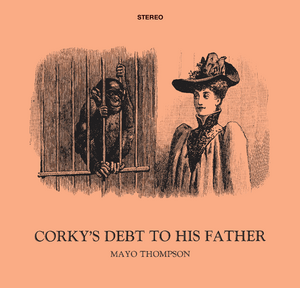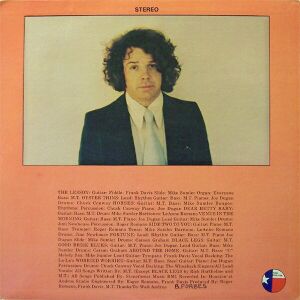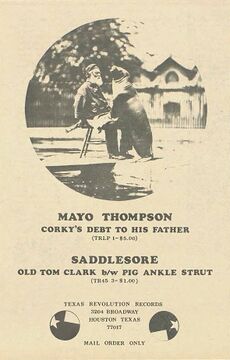Corky's Debt to His Father: Difference between revisions
imported>Dotclub No edit summary |
imported>Dotclub No edit summary |
||
| Line 92: | Line 92: | ||
=== Texas Revolution === | === Texas Revolution === | ||
1970 | |||
=== Glass === | === Glass === | ||
198? | |||
=== Drag City === | === Drag City === | ||
1994 | |||
== Reviews == | == Reviews == | ||
Revision as of 04:24, 26 May 2023
| Corky's Debt to His Father | |
|---|---|
 | |
 | |
| Studio album by Mayo Thompson | |
| Released | 1970 |
| Recorded | 1970 |
| Studio | Walt Andrus Studio
Houston, Texas |
| Label | Texas Revolution |
Tracklist
| No. | Title | Length |
|---|---|---|
| 1. | "The Lesson" | 2:39 |
| 2. | "Oyster Thins" | 6:00 |
| 3. | "Horses" | 3:09 |
| 4. | "Dear Betty Baby" | 3:47 |
| 5. | "Venus in the Morning" | 2:30 |
| No. | Title | Length |
|---|---|---|
| 1. | "To You" | 2:50 |
| 2. | "Fortune" | 2:11 |
| 3. | "Black Legs" | 3:50 |
| 4. | "Good Brisk Blues" | 3:07 |
| 5. | "Around the Home" | 2:50 |
| 6. | "Worried Worried" | 5:03 |
| Total length: | 37:56 | |
Background

- Recording began in February 1970
- Released mail-order only in 1970 by Texas Revolution
- Instrumental B-side outtake: Woof
- Released a single as in January 1971 as Saddlesore: Old Tom Clark
- Reissued in the 80s by Glass Records
- Reissued in 1994 by Drag City
- Mayo Thompson played the full album in concert in 2013 and 2019
Further reading: Jasper Leach and Joel Minor's article "Fortune, Fates, And Random Chances: The story of Mayo Thompson’s Corky’s Debt to His Father"
Personnel
Mayo Thompson - vocals, guitar, bass
Additional musicians
Mike Sumler, Joe Dugan (piano), Chuck Conway (drums), Jimi Newhouse (drums), Carson Graham (drums), Frank Davis, Le Anne Romano (baritone horn), Roger Romano, The La La's (backing vocals), The Whoaback Singers (backing vocals)
Technical
- Mayo Thompson - producer
- Frank Davis - producer, engineer
- Roger Romano - producer, engineer
Cover art
The cover image is an illustration by John Charles Dollman for an article in the British newspaper The Graphic published September 10, 1892.[1]
-
"Wanderings in the Zoo"[2]
Releases
Texas Revolution
1970
Glass
198?
Drag City
1994
Reviews
New Musical Express
January 18, 1986[3]
Richard North
Apparently this "legendary" and rare LP was first released in Texas in 1972 with only 500 pressed. Hats off to Glass for resurrecting it. One always looks forward to Mayo's output 'cause of his kooky-colourful work with Red Crayola, Pere Ubu, et al. A fine track record which is only enhanced by Corky's Debt. [...]
CMJ New Music Report
June 13, 1994[4]
Drag City has reissued Corky's Debt To His Father, the hard-to-find 1970 solo album by Mayo Thompson, leader of the Red Crayola for almost three decades and a member of Pere Ubu in the early '80s. Corky, his only solo outing, is unlike anything he's done before or since, with a focus on melody and twisted lyrics in song structures that are relatively conventional compared to the psychedelic freakouts, experimentation and jagged pop of the Red Crayola. The beautiful ballad "Dear Betty Baby" is an unqualified masterpiece. Look for the first two Red Crayola albums to be reissued on the Collectibles label and a new Red Crayola album in the fall, with Thompson joined by members of Gastr Del Sol.
Chicago Reader
June 16, 1994[5]
John Corbett
Chicago Tribune
1994
Greg Kot
Recorded 24 years ago in Houston for an obscure record label and then all but forgotten, "Corky's Debt to His Father" has been reissued on CD, its considerable wonders undiminished. Thompson has fashioned a significant legacy in underground circles as a producer, talent scout and recording artist (notably with the Red Crayola), and this record presents his catholic tastes and eccentric talents at their most accessible. Ranging from baroque pop worthy of Van Dyke Parks to stark acoustic ballads and barrelhouse blues, "Corky's Debt ..." is musically dazzling. The sophistication of the arrangements and writing — particularly on "To You" and "Around the Home" — makes Thompson's sometimes uncertain tenor seem even more vulnerable as he pours out his erotic longings.
Tower Pulse
1994
Scott Miller
Mayo Thompson's Corky's Debt to His Father isn't being reissued as much as it's finally having its day. The album was recorded in 1970 after Thompson's ground-breaking yet completely overlooked group, the Red Krayola, temporarily disbanded. It's a beautiful and introspective album, along the linen of Big Star's 3rd or the Beach Boys' late-'60s work. Backing off from the urgent stabs at ideas and possibilities that characterized Krayola, it shows a more immediately traditional (coherent) approach toward songwriting. But aside from a small U.K. repressing in the mid-'80s, it was out of print for almost a quarter century prior to the recent Drag City reissue (the label also has a new Krayola album due soon).
"I started making music because I thought it was wide open," says Thompson from his home in Houston. "That all one did was have ideas — perform these ideas — that interesting ideas did come through and that it was possible to do interesting things in this framework." Though it may not initially sooths, this is not an alienating record. It has a timeless quality — not fitting readily into any one category or era. Thompson was taking an honest shot at competing in the solo artist world that prevailed in the early '70s — presenting a stimulating alternative to the mind-numbing strains of James Taylor and friends. "I was anxious to distinguish myself from the people with whom I saw myself in some generic association — the solo artist, the songwriter." Corky operates on several levels and deserves to be heard. It's humorous and wistful, lyrically stimulating — bluesy at times, though it's more like the blues are playing Thompson than the other way around. He writes in a style all his own, twisting common language into poetry. Always uniquely Thompson, Corky blurs boundaries and begs only for an attentive ear.
The Trouser Press guide to '90s rock
1997[6]
In 1970, Thompson actually did record a solo album, Corky's Debt to His Father, which got an obscure local-label issue at the time in Texas, was revived in England years later and was finally introduced to American CD racks through the good offices of Drag City. A left-field version of a blues and neo-vaudeville album — played mostly acoustic on slide guitar, piano, bass and elementary traps, with some horns and electricity — Corky's Debt doesn't sound much closer to any mainstream in 1995 than it would have done a quarter-century earlier. The fairly titled "Good Brisk Blues" might have come from a Dylan bootleg, and "Venus in the Morning" does suggest a functional knowledge of barrelhouse music, but the lyrics ("they cover her politely from all indelicate eyes") are from a completely different realm. A self-conscious embrace of abnormality in all its glorious dislocation.
References
- ↑ https://www.mediastorehouse.com/fine-art-finder/artists/english-school/wanderings-zoo-engraving-22221880.html
- ↑ [The Graphic illustrated newspaper September 10, 1892 pg. 22 https://www.britishnewspaperarchive.co.uk/viewer/BL/0000057/18920910/031/0022]
- ↑ https://www.rocksbackpages.com/Library/Article/mayo-thompson-icorkys-debt-to-his-fatheri-glass
- ↑ https://worldradiohistory.com/Archive-All-Music/CMJ/1994/CMJ-New-Music-Report-1994-06-13.pdf
- ↑ https://chicagoreader.com/music/a-genre-of-one/
- ↑ https://archive.org/details/trouserpressguid00robb_1/page/597/mode/1up
!["Wanderings in the Zoo"[2]](/w/images/thumb/e/e7/Corky-The-Graphic.jpg/152px-Corky-The-Graphic.jpg)